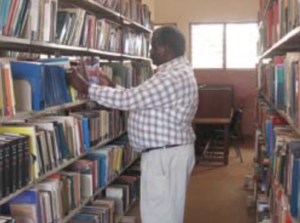AGORA programme allows Bunda College of Agriculture community to look for agricultural information.
Published: jueves 29th septiembre 2011
Research4Life’s AGORA programme allows Bunda College of Agriculture to help not only staff and students but anybody in Malawi looking for agricultural information.

Geoffrey F. Salanje in the Bunda College of Agriculture Library.
As head of the library at Bunda College of Agriculture, Geoffrey F. Salanje provides information in support of more than 20 undergraduate and postgraduate programmes. Before 2004, when Bunda’s library became the first in Malawi to register for access to AGORA, HINARI and OARE, college students and staff relied on paid access to journals or on public search engines such as Google. The former offered a limited selection of research and required annual funding, and the latter were often restricted to incomplete or unreliable publications. The library could also request publications from organizations such as, FAO, WHO and the Technical Centre for Agricultural and Rural Cooperation (CTA), but the time to both make requests and receive the information was prohibitive.
The librarians were stretched to their limits because of users’ over-reliance on the library for printed resources and CD-ROMS, given the lack of high-quality scientific information available online. In effect, the library was the only source of information for teaching, learning, research and outreach. Not only has Research4Life reduced the librarians’ workloads, but it has also eased pressure on library resources because users can access information online without visiting the library. Mr Salanje and his team have also launched a Question and Answer Service (QAS), initiated by CTA in 2004.
“With AGORA, the library easily responds to requests for information from farmers, researchers, teachers, extension workers and students,” explains Mr Salanje. “The service is open to anybody in Malawi who wants information on agriculture, rural development and related subjects. We are convinced that the QAS has improved farmers’ produce, research outputs and results, and the acquisition of teaching, extension and learning skills in Malawi.” «I no longer ponder about where to search for scientific information requested by researchers».
Bunda College of Agriculture was recently selected to host regional PhD programmes in aquaculture and fisheries science, and agricultural and resource economics. One of the main reasons for this achievement was the availability of relevant and current information resources. These programmes had their first intake in 2009.
On a personal note, Mr Salanje says that AGORA, HINARI and OARE have contributed to his own career advancement, simplifying his work and allowing him to gain skills and expertise in searching for and retrieving online information.
This story is part of “Making a difference: Stories from the field” an illuminating series of case studies providing insights into how access to peer-reviewed research from Research4Life is benefiting the health, well-being, and economic and social development of communities in the developing world.





